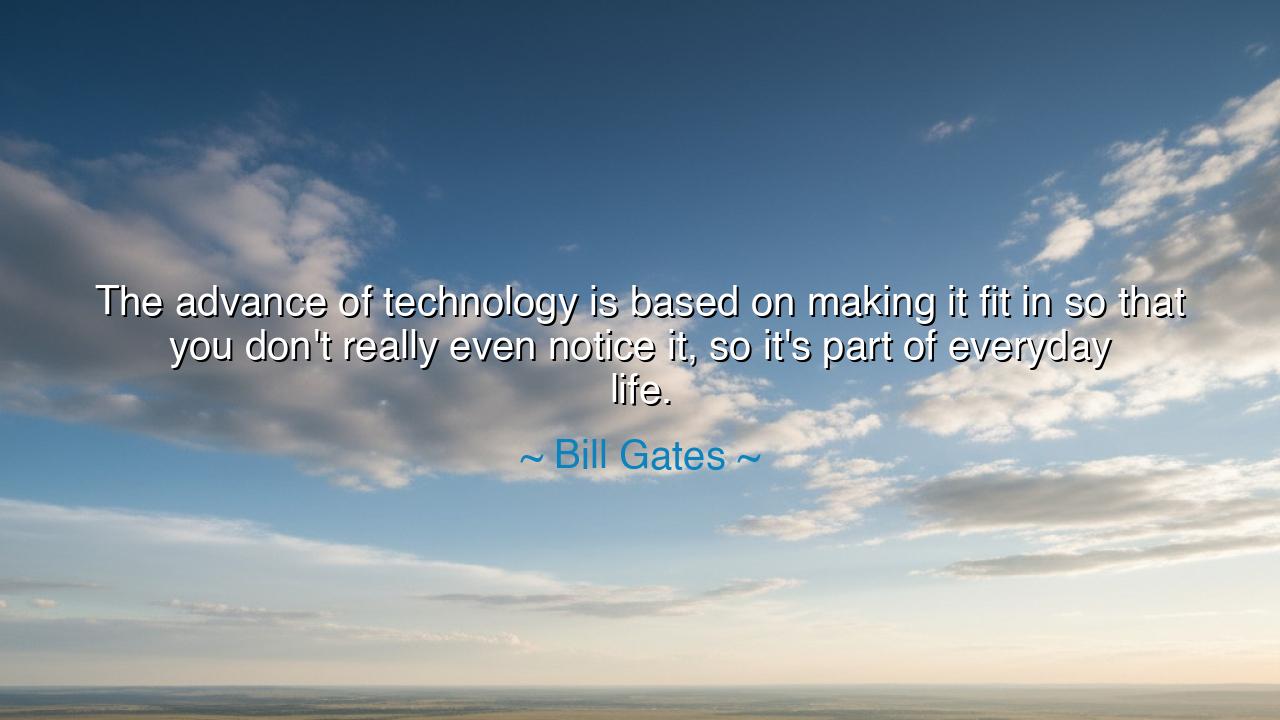
The advance of technology is based on making it fit in so that
The advance of technology is based on making it fit in so that you don't really even notice it, so it's part of everyday life.






The words of Bill Gates—“The advance of technology is based on making it fit in so that you don't really even notice it, so it's part of everyday life”—reveal a truth that shines like a quiet flame. The greatest triumph of technology is not its loudness, not its spectacle, but its invisibility. True progress is when invention ceases to feel foreign and becomes as natural as breathing, as ordinary as water flowing from a well. The mark of success is not when men marvel at a device, but when they use it without thought, when it dissolves into the fabric of life itself.
The origin of this wisdom lies in the long journey of human invention. Consider the wheel. When it was first carved by the ancients, it was a marvel, perhaps feared, perhaps doubted. Yet in time it became so ordinary, so essential, that no one thought to question it. It ceased to be an invention and became a way of life. The same is true of fire, of writing, of the plow. In their youth, they were disruptions; in their maturity, they became invisible foundations upon which civilizations rose. Gates, with his eye for the future, merely places himself in this line of truth: technology achieves its destiny when it no longer astonishes, but simply is.
Consider also the story of the electric light. When Edison’s bulbs first glowed, crowds gathered in awe to witness the miracle of harnessed lightning. It was unnatural, it was dazzling, it was revolutionary. Yet today, when we flip a switch, we do not marvel—we expect. Light has become so deeply woven into our nights that we no longer notice it. That is the triumph: when invention ceases to interrupt life and instead becomes life itself.
So too with Gates’s own legacy in the realm of computers. Once, computing was the realm of specialists, machines locked in vault-like rooms, accessible only to a chosen few. To ordinary people, they were intimidating, alien, impossible. Yet Gates envisioned a world where the computer was so natural, so fitted into the rhythm of daily existence, that it ceased to feel like technology at all. The personal computer on a desk, the software running seamlessly in the background, the quiet hum of a machine serving without demand for marvel—this was the true victory. Technology that vanishes into daily life is the highest form of progress.
But this truth also carries a challenge. For when technology becomes invisible, we forget its power, its origins, and its costs. The water that flows from the tap hides the labyrinth of pipes and pumps beneath the ground. The smartphone in our hand hides the vast networks, factories, and labors that make it possible. To use without awareness is to risk dependency without wisdom. Thus, while the mark of progress is invisibility, the duty of wisdom is remembrance: never forget the miracle that lies behind the ordinary.
The lesson for us is therefore twofold: first, do not fear when new technologies seem strange or overwhelming, for if they are true inventions, they will one day fade into the fabric of life. Second, do not grow complacent when technologies become ordinary, for they remain powerful forces shaping our existence. Marvel at them when they are new; respect them when they are old.
In practice, this means cultivating both acceptance and awareness. Embrace the technologies that make life smoother, richer, more humane. Let them serve you until they vanish into habit. But also pause, from time to time, to look behind the curtain, to ask what sustains this invisible web, and whether it serves humanity or enslaves it. For the tools that blend into daily life wield the greatest influence, and only by recognizing their hidden power can we ensure they are guided toward good.
So let Gates’s words echo as a guiding flame: the true advance of technology is not in its spectacle but in its seamlessness, not in its noise but in its quiet, not in its strangeness but in its belonging. The greatest inventions are not those that astound us once, but those that sustain us always. Let us embrace them with gratitude, use them with wisdom, and remember always that behind every ordinary miracle lies the extraordinary labor of human hands and human minds.






AAdministratorAdministrator
Welcome, honored guests. Please leave a comment, we will respond soon